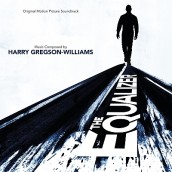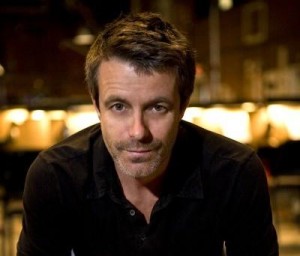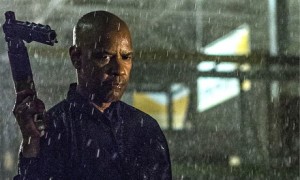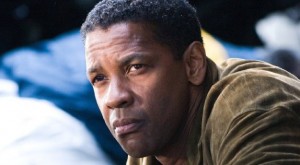Harry Gregson-Williams has often been a man on a mission of dark righteousness. Sure he’s done far gentler scoring for the likes of ANTZ, SHREK, THE TIGGER MOVIE, ARTHUR CHRISTMAS and the first two NARNIA movies, where he even essayed the voice of Patterwig the Squirrel. But if you cross the side of justice, just hear Williams’ family-friendly orchestral voice set its watch to 60 seconds, and become a distinctive sound of simmering electronics, imposing strings, slicing rock guitars and beds of raging percussion – melodic, often hallucinatory music that builds for characters’ with haunted pasts to explode into body count action in such scores as SPY GAME, DOMINO, GONE BABY GONE and THE TOWN. And when that music is in the hands of Williams’ frequent embodiment of vigilantism known as Denzel Washington, you can be sure the bad guys are going to hit the floor with a distinctively dream-like tone of emotional, and percussively brutal efficiency, no more so than with the stopwatch countdown of a rebooted Robert McCall in the cinematic spin of the 80s CBS show THE EQUALIZER.
THE EQUALIZER marks the first time in sixteen years that Gregson-Williams has teamed with filmmaker Antoine Fuqua, who set him on a more-than occasional musical path of darkness with 1998s assassin free-for-all THE REPLACEMENT KILLERS. However, it’s certainly not the first time Gregson-Williams has been to the action dance with Denzel Washington, most often in the company of late director Tony Scott, who had the charismatic leading man playing civilians who battled runaway trains in THE TAKING OF PELHAM ONE TWO THREE and UNSTOPPABLE, a cop using time travel to stop a murder in DEJA VU and an ex-military man out to severely mess up the thugs who’ve taken a little girl in MAN ON FIRE.
It’s that character, and plot that THE EQUALIZER resonates the closest with, as not so ex Black Ops operative McCall avenges the abuse heaped on the teen prostitute Terri (Chloe Grace Moritz). As is the case with the prolifically versatile composer’s frequent entries into the thriller genre, Gregson-Williams goes for his own film noir tone, using the electronic vibe that distinguished his rise alongside Hans Zimmer’s team, as paired with an organic orchestral approach, creating a hypnotic hybrid sound that deals with inner, thematic turmoil as much as it does meting out rhythmic payback. It’s a skill that THE EQUALIZER does with brutal, anguished proficiency, its sound a long way from Stewart Copeland’s far brighter synth groove for Edward Mulhare back in the TV day.
With such other suspenseful scores waiting to be unleashed from Gregson-Williams for Michael Mann’s cyberthriller BLACKHAT and the next evolution in the CALL OF DUTY videogame series, the composer talks about a style that gets into the soul of his tormented characters, and one actor in particular who’s out again for the big payback.
ASSIGNMENT X: Did you ever watch the original EQUALIZER
HARRY GREGSON-WILLIAMS: Yes, I did watch THE EQUALIZER back in the day. I don’t recall Stewart Copeland’s original score, but I do recall the character of Robert McCall and what a smooth, cool personality he was. Maybe it was his English accent! But the character of McCall changed quite a bit with Denzel’s portrayal in this version, I think. Denzel brings such a gravitas to anything that he does and I found him entirely believable throughout the film. In fact, I recall Antoine Fuqua telling me that Denzel had said to him, “I don’t want my character to do anything that I can’t do myself.” He didn’t want him to have any superhuman strength or powers. He wanted his actions to be believable and not have a heightened reality to them. So that was a guideline for me; that the music should be grounded in reality and not too fantastical.
AX: THE EQUALIZER is your fifth movie with Denzel. What kind of qualities do you think he brings to your music as both an action hero in MAN ON FIRE and THE EQUALIZER, as well as when he’s playing a regular guy thrust into dangerous situations in UNSTOPPABLE and THE TAKING OF PELHAM ONE TWO THREE?
WILLIAMS: Denzel is an amazing actor and certainly Tony Scott must have shared that opinion by casting him numerous times and I was fortunate enough to score some of these films. He brings a certain star power to a part without being too conspicuous somehow – he’s never too showy and always interesting. I don’t know how he does it, but he does.
AX: The last time you scored Denzel on a mission of vengeance, it was for MAN ON FIRE How do you think they differ when it comes to their personalities, and music?
WILLIAMS: The lead character in MAN ON FIRE is very driven by what his heart tells him. This is very similar to the character in THE EQUALIZER. They both use their heads, too. They are smart about their actions and seem to know what they’re doing, so these personality traits are certainly similar. They are both on a vengeance mission and both are triggered by the actions of a young girl. In MAN ON FIRE, it was a child. In THE EQUALIZER, it is a young woman. I got the feeling that in MAN ON FIRE, Denzel’s character had always been a loner that had never really connected with anyone, whereas in THE EQUALIZER, we learn that McCall’s wife had passed away and that they had shared a loving relationship.
AX: How did you want to show Robert’s humanity, and the sadness that cloaks him?
WILLIAMS: I love the scene at the beginning where we first meet Robert. We can see that he is a very solitary, self-contained man who’s not needy and not dependent on anyone else. There is certain sadness in that knowledge and the music reflects that. He’s torn as to whether he can continue the life he leads now or whether he has to go back to something more violent and volatile.
AX: With so much secrecy about Robert’s background, did you find yourself inventing his past while writing the score?
WILLIAMS: Not at all. Antoine asked me to score what I saw on the screen and to be quite literal with his character.
AX: When it comes to Teri’s character, did you want the music to paint her a lost child?
WILLIAMS: No, not as a lost child, but more as a sensitive soul in search of meaning. Her character really is in need of belief in a future. The one really stand-out scene that Denzel and Chloe share together – in the cafe – where she really lays that out on him and he implores her to be what she wants to be and what she can be is a winner, I think. We found it necessary to score this whole scene, but we didn’t want it to be in your face at all. It’s a very quiet, sensitive, and supporting cue and only makes a couple moves and shakes; and hopefully enhances the sense of innocence lost and of secrets shared.
AX: Antoine Fuqua gave you your first all-out action score with THE REPLACEMENT KILLERS in 1998. How important do you think that score was for launching you into that realm, and what’s your collaboration been like for this film?
WILLIAMS: It’s been fantastic working with Antoine again. We’ve both been involved in multiple projects since THE REPLACEMENT KILLERS, and yet he’s certainly made a leap of faith to circle back to me as his composer and I’m really grateful for that. THE REPLACEMENT KILLERS was very important for me as a composer at that time, for my confidence and feeling of worth. I had not embarked on a solo action score before and this was a great opportunity, and while the film/score wasn’t particularly well-liked or well-received, we had a good time on it, and we both went off to make many other films as a result of it, I think. I’m happy to say that I’m already writing the score for his next movie called SOUTHPAW, which stars Jake Gyllenhaal.
AX: Another frequent director you worked with is the sadly passed Tony Scott. What kind of inspiration did he give you? And do you think directors like Antoine carry on his stylish spirit?
WILLIAMS: Tony continues to be my inspiration on many levels, actually. He made a huge impact on my life, you see…not to mention my career. He was thoughtful and sensitive towards my music, and me, yet at the same time über critical and impossibly demanding and we went through an awful lot together. Eight or nine feature films (all with in excess of 70 minutes of music), a few short films, commercials, and various TV projects all spanning 18 years, is something really special in this business, It was a heck of a ride and an unbelievable honor for me to be a part of. It’s still difficult for me to imagine this journey can’t continue…he died two years ago last month.
AX: How did you want your music to “hit” Antoine’s “over and out” depiction of violence that Robert often sets to his stopwatch?
WILLIAMS: Antoine made it clear that he wanted sound effects to play a large part in the action sequences – for the music to stand out on occasion, but not always, and when it did, it needed to be sharp and punctuate various events.
AX: More than ever with THE EQUALIZER, you’ve hit a vibe where samples and electronic percussion are completely bonded to the orchestra. Would you say that’s your signature when it comes to action scores?
WILLIAMS: Yes. Certainly that’s the way I compose my scores. There’s a hybrid here between electronic and acoustic instruments. I love the spot where these seemingly disparate things converge!
AX: While THE EQUALIZER has harsh, slicing notes, do you think there’s a dream-like quality to the score here as well during it’s more introspective moments?
WILLIAMS: Absolutely. There are two facets to the music for Denzel Washington’s character. On the one hand, there is a gentle, safe, calm, and deliberate feeling, which you can hear during introspective moments – often portrayed simply by a melodic piano theme. On the other hand, when he springs into action, there is a dangerous, swaggering, and muscular tone that can be heard. For this, I employed heavy drums, guitars, and synths. There were occasions where I employed a medium-sized string section to pull out emotion within both of these thematic strands, either vengeful and violent or reflected and sad.
AX: Could you talk about your continued relationship with Hans Zimmer as a “go to” composer on his team?
WILLIAMS: I do have (and am proud of) a long-term relationship with Hans, and yes, I suppose my music is heavily influenced by what I learned in the late 1990s as his apprentice. I do hope that I’ve evolved since then musically. I know Hans has. But is it part of my DNA? Absolutely. Is that something I’m ashamed of? Nope. Is it something that’s a work in progress? Yes. I hope at this stage that I’ve found my own voice.
AX: You’ve next got Michael Mann’s cyber thriller BLACKHAT coming up. There’s always been a “circuitry”-like pulse to your rhythmic music. In that respect, did that make this collaboration slightly easier than it might have been, or one as demanding as his other composers’?
WILLIAMS: I actually finished scoring BLACKHAT a few months ago. I worked on it for the first six months of this year. I delivered my score in June, having had an interesting time on the project. It was like nothing else I’ve ever experienced. The film is excellent and quite unique and also very topical. Hacking! We all know that he rarely uses a single composer on his scores and I hear that other people might be at work on the film, but whatever works for him, you know. It’s his way. For my part, I wrote 80 minutes of music for a film I liked a lot, and I am looking forward to seeing how much of that will be used in the final version. I have no idea, but I’m hopeful…
AX: Right now you’re scoring the most ambitious game yet in the CALL OF DUTY franchise. What can you tell us about your approach to it, and how it will reflect both the new technology of the PS4 console, and those advancements it’s given to the line of games?
WILLIAMS: I finished scoring CALL OF DUTY: ADVANCED WARFARE in July. I recorded the orchestral elements up at Skywalker Ranch and had some good results there, which I was thrilled with. The new technology of the PS4 console, and other alike platforms such as XBox One, allows for more memory, disk space, and faster processing. This also means the music is able to be played at full fidelity, more specifically at 48kHz, as opposed to previous “Call of Duty” games where the sample rate had to be converted down to fit on the console disk. More processing speed allows for more advanced mixing systems, which in turn, lets the audience experience the music, and all other audio, at a much higher dynamic range.
One of the main goals that Sledgehammer Games looked to accomplish with “Advanced Warfare” was not to make it sound “futuristic”, per-say, but more “advanced”, as the title implies. They wanted the sound design and music to always be “grounded” through the use of natural and organic sounds/musical ideas in combination with more futuristic sounds. I think the score contributed these humanistic elements that emphasized the drama and story-telling aspects of the game.
AX: There’s a whole other, far happier nature to your music with such scores as THE TIGGER MOVIE and ARTHUR CHRISTMAS. Do you try to emotionally vary them up with your darker work so you won’t be immersed in that emotion for so long?
WILLIAMS: Absolutely. I love to work on films such as these. I’m a happy guy by nature, but somehow over the years I’ve been drawn to a lot of dark thrillers. There was something very, very joyful about producing reams and reams of happy, elf-like Christmas music in mid-June with the sounds wafting over Venice beach! What’s not to like? I had a great time working on that movie.
AX: With that being said, do you have a particular affection for modern-day film noirs after scoring movies like MAN ON FIRE, THE TOWN and THE EQUALIZER?
WILLIAMS: Yes, of course I do have a particular affection for these types of movies, BLACKHAT being another one of them. I hope to work on many more genres as well in the future. I’m excited to work with Catherine Hardwicke later this year on her movie MISS YOU ALREADY, as this is a bit of a departure for me. Great script, awesome director.
AX: If you had a favorite television show whose movie version you’d like to score, what would it be? And what musical spin would you like to give it?
WILLIAMS: MASTERS OF SEX. I’d inevitably have to give it some balls.
“The Equalizer” opens on September 26th, with Harry Gregson-Williams’ score on Varese Sarabande Records available September 23rd HERE
Article Source: Assignment X
Article: Interview with THE EQUALIZER composer Harry Gregson-Williams
Related Posts:














